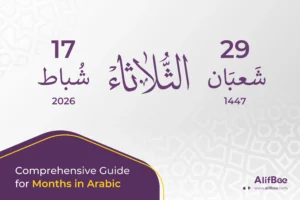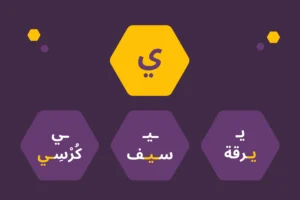How to Build a Strong Arabic Vocabulary
Did you know that mastering vocabulary is the most crucial part of learning any new language?
Studies have shown that a robust vocabulary enhances communication skills, reading comprehension, and overall language proficiency. When it comes to learning Arabic, building a strong vocabulary is essential for understanding and engaging with the rich cultural and linguistic heritage of the Arab world.
In this post, we will explore effective strategies, tools, and resources to help you pick up and retain Arabic vocabulary.
Understanding Arabic Vocabulary
Characteristics of Arabic Vocabulary
Root System: The Arabic language is built on a triliteral root system, where most Arabic words are derived from three-letter roots. This system allows learners to understand and predict the meanings of new Arabic words by recognizing their roots. For instance, the root “ك-ت-ب” (k-t-b) relates to writing, forming words like “كتاب” (kitab – book) and “كاتب” (katib – writer).
Loanwords: Arabic has absorbed many loanwords from other languages, including Persian, Turkish, French, and English. Recognizing these can make learning easier. For example, the word “بنك” (bank) is borrowed from English.
Dialectal Variations: Arabic vocabulary can vary significantly across different dialects. While Modern Standard Arabic (MSA) is used in formal settings, regional dialects (e.g., Egyptian, Levantine, Gulf Arabic) have their own unique vocabulary. Understanding these differences is crucial for effective communication.
Strategies for Building Vocabulary
Active vs. Passive Learning
Engage with new Arabic words through speaking, writing, and sentence formation for active learning. Passive learning involves listening and reading Arabic materials, both crucial for expanding vocabulary.
Thematic Learning
Organize Arabic vocabulary by themes like family, food, or travel. This method helps learners build a cohesive set of Arabic words around specific topics, making them easier to recall and use in context.
Use of Flashcards
Flashcards are excellent for spaced repetition and visual learning. Digital flashcards help review Arabic words at optimal intervals.
Contextual Learning
Learn Arabic words in context by reading Arabic texts, watching media, and listening to conversations. This approach helps in understanding the proper usage and meaning of words.
Practice with Native Speakers
Engage with native Arabic speakers through language exchange programs or conversation partners. Many platforms connect learners with native speakers for practical vocabulary reinforcement and feedback.
Tools and Resources for Enhancing Vocabulary
Mobile Apps
Apps like AlifBee offer interactive and engaging ways to learn Arabic vocabulary. It provides structured lessons, gamified learning experiences, and progress tracking features.
Online Dictionaries and Translators
These are used as valuable tools for looking up words and understanding their meanings. These resources offer translations, example sentences, and pronunciation guides.
Language Learning Websites
Websites like AlifBee offer comprehensive courses and resources for learning Arabic. That includes vocabulary lists, grammar explanations, and practice exercises tailored to different proficiency levels.
Books and Textbooks
Using recommended books and textbooks for various proficiency levels can significantly enhance your vocabulary.
Multimedia Resources
Arabic TV shows, movies, and YouTube channels are excellent for immersive learning. They expose learners to authentic language use and cultural context. Arabic music and podcasts also play a role in language immersion, making vocabulary learning enjoyable.
Ways to Practice Arabic Vocabulary
Regular Practice
Daily practice is crucial for vocabulary retention. Setting achievable goals and creating a study schedule can help maintain consistency and track progress.
Engaging with Arabic Content
Reading Arabic newspapers, blogs, and social media content exposes you to contemporary vocabulary and usage. Writing exercises, such as keeping a journal or writing essays, reinforce learning through active use.
Interactive Activities
Language games, puzzles, and joining Arabic learning communities and forums offer interactive ways to practice Arabic vocabulary. These activities make learning fun and engaging.
Monitoring Progress and Staying Motivated
Tracking Progress
Keeping a vocabulary journal and using language learning apps, like AlifBee, to track milestones can help monitor your progress. Seeing your improvement can be a great motivator.
Staying Motivated
Setting short-term and long-term goals, celebrating achievements, and finding a study buddy or joining study groups can keep you motivated. The support and encouragement from others can make the learning journey more enjoyable.
Final word
Building a solid Arabic vocabulary is a rewarding journey that opens up a world of cultural and linguistic richness.
You can enhance your Arabic vocabulary and overall language proficiency by implementing the strategies, tools, and resources mentioned in this post.
If you found this article useful, you can read How to Increase Arabic Vocabulary in 7 Steps. The article will take you step by step to increase Arabic vocabulary.
Don’t forget to download our learning app to start learning and practicing Arabic vocabulary and many other areas of the Arabic language.








